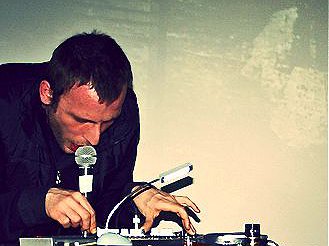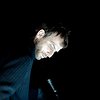In the 20th century, the relationship between music and other forms of art – painting, video art and cinema most importantly - has become increasingly important. How do you see this relationship yourself and in how far, do you feel, does music relate to other senses than hearing alone?
I don't think I can say anything very personal about the so called multimedia stuff. Of course what we call reality is multimedia, so why shouldn't art be?
And about the relation of music with other senses… Well, I am not a neuroscientist so I really don't know, but I can say that when I play I don't really aim for the ears, but for the central nervous system. Or at least I wish it would be so.
In how much, do you feel, are creative decisions shaped by cultural differences – and in how much, vice versa, is the perception of sound influenced by cultural differences?
Creative decisions are shaped by the view of the world that each of us have, I wouldn't say "cultural" differences. My brother is an architect, we did the same schools, went to the same church, played in the same football and rugby team, and we have been raised by the same highly educated parents and highly educated grand-parents. But yet his weltanshauung is so different to mine and, you won't believe, he is not me!
I am really not sure that culture could explain everything, and I don't think that our minds are empty crates filled with culture. Creative decisions are shaped by what we are, and what we are is culture and much more of it. Vice versa, same…
Do you feel it important that an audience is able to deduct the processes and ideas behind a work purely on the basis of the music? If so, how do you make them transparent?
On a live situation, as I said before, I wouldn't separate "music" from all the rest and I am not sure if I want the audience to actually deduct anything. I want them and me to experience something purely on the basis of the performance. And if within the performance I stop "making sounds" and start to read a text about the inherent meaning of me making sounds well, isn't it part of the performance? And by doing so I am integrating (and negating) the process of deduction in the performance.
Or imagine that I wanna make a performance, let's say, about the labyrinth, my goal is not to have people to deduct "labyrinth", but to place the audience - and myself - within the labyrinth. Then of course I could use sounds of footsteps, or doors shutting one after the other, voices lost in huge reverbs, simple elements that could contribute to the abstract idea of "labyrinth" , but the ability is not to use them behind the loudspeaker ("ash, in the music there is a labyrinth!"), but in within the space.
And the form of the music has to be unpredictable, all straight lines have to be broken, direction lost. And if I am in the labyrinth, if I am lost in an incomprehensible structure, how could the structure of the performance be any different?
I like labyrinths… we bring emotions on stage that we can't control, and even before we start to make the first sound we understand that we are not in control, and that's what I call improvisation.
Usually, it is considered that it is the job of the artist to win over an audience. But listening is also an active, rather than just a passive process. How do you see the role of the listener in the musical communication process?
Audience, and the alienation of the performer (that is actually the audience himself), are the center of artistic expression since forever. Inter-active art; what a stupid redundancy created by an art theory too long dominated by the false myths created by Marxism and materialism.
For me it's really impossible to grasp the inner life of artistic communication wiping away the traditional meaning of it. But I am a religious man.
Music-sharing sites and -blogs as well as a flood of releases in general are presenting both listeners and artists with challenging questions. What's your view on the value of music today? In what way does the abundance of music change our perception of it?
Music is abundant and very accessible. Very good, and not that challenging if you wanna listen to music and you have enough sixth sense to discern what deserves your attention…
Please recommend two artists to our readers which you feel deserve their attention.
Claudio Rocchetti, Mario De Vega, Helena Gough, Luciano Maggiore… and that's four of them.
Read (a little) and hear (a little) about Velerio Tricoli at www.bowindorecordings.com



